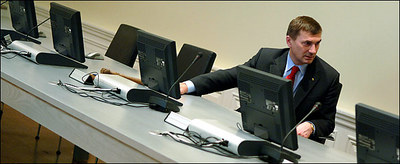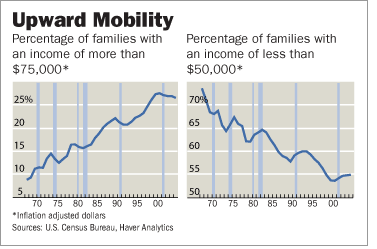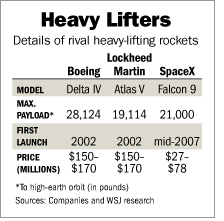My sixth grade daughter’s teacher asked that the students have their parents write a paragraph about some memorable event that occurred during the year the parent was a sixth-grader. Here is what I wrote:
I was in sixth grade during the fall of 1964 and the spring of 1965. My main memory of that year was the election for president in 1964. My family strongly supported Barry Goldwater. We thought he spoke honestly and believed in freedom. My family became very discouraged as the polls showed that Goldwater was losing very badly. In the end, he lost 49 states and only won his home state of Arizona. I remember us all sitting in front of the TV a few days before the election, watching a short speech by a former actor, who said that freedom was worth fighting for, and that we should not give up hope. His name was Ronald Reagan.
Month: December 2005
Mathematical Rigor
Mathematics brought rigor to economics.
Unfortunately, it also brought mortis.
Attributed, in various versions, and in various places, to Kenneth Boulding.
Nebraska Congressman Opposed Government Supporting Agricultural Prices
(p. 85) ". . . in March 1911 Nebraskan Representative George W. Norris sponsored a congressional resolution asking the Attorney General to investigate "a monopoly in the coffee industry." Wickersham replied that he indeed was conducting an ongoing investigation.
(p. 86) In April, Norris lambasted the coffee trust from the floor of the House, summarizing the valorization loan process. He concluded that "this gigantic combination [has been able] to control the supply and the sale of coffee throughout the civilized world. [They] sold only in such quantities as would not break the market." Frustrated by Brazil’s involvement, he observed that when a conspiracy to monopolize a product involved a domestic corporation, it was termed a trust and could be broken. "But if the combination has behind it the power and influence of a great nation, it is dignified with the new term ‘valorization.’ Reduced to common language, it is simply a hold-up of the people by a combination."
Source:
Mark Pendergrast. Uncommon Grounds: The History of Coffee and How It Transformed Our World. Basic Books, 2000. (ISBN: 0465054676)
Hiring Managers for Experiences They Have Had
Christensen and Raynor in The Innovator’s Solution argue against hiring managers for having ‘the right stuff’ and favor hiring managers who have had the right experiences tor the job that needs to be done. Maybe western venture capitalists are following this advice in China?
SHENZHEN, China — China still is a magnet for ambitious, Western-educated entrepreneurs coming home to start high-tech companies and cash in on China’s economic boom. Take Charles Zhang, the Massachusetts Institute of Technology-trained founder of Web portal Sohu.com Inc., and Edward Tian, who earned a doctorate in the U.S. and once charmed Rupert Murdoch into joining the board of his Beijing telecommunications company.
But this favored class isn’t looking quite so favored, at least in the eyes of venture capitalists looking to invest in China. The trend is largely anecdotal, but for many “seed capitalists” poking around Beijing and Shanghai, slick Westernized returnees are out. Local, rough-around-the-edges entrepreneurs are in.
“The less English you speak, the better,” says David Zhang, a venture capitalist in Beijing with San Francisco’s WI Harper Group. He and other investors say locally trained executives often are more thrifty with cash and better understand local Chinese markets — and businesses that know how to tap them — than people who have been abroad for years.
“A lot of the returnees, actually, they have lost touch with China,” agrees Vincent C.H. Chan, a managing director at Jafco Asia, part of Jafco Co. of Japan.
Instead of courting Ivy League graduates with slick business plans, Messrs. Zhang and Chan are plowing money into no-frills Chinese start-up businesses such as wireless-services provider China Broad Media Corp. The company, funded by WI Harper, is the brainchild of Tian Song, an entrepreneur who went to college in Beijing and toiled in the state-owned telecommunications sector there. He says, through a translator, that his only visit to the U.S. was a brief trip to Las Vegas.
Jafco has helped to finance such entrepreneurs as Zhou Hongyi, who founded Chinese Internet search-engine concern 3721 Network Software Inc. Yahoo Inc., intrigued by Mr. Zhou’s technology — it enables people to use Chinese characters to search the Web — bought the company nearly two years ago for $120 million.
Some returnees may have “studied in a good school,” says Andy Yan, managing partner of Hong Kong investment firm SAIF Partners. But “when they come back, they think they know everything.”
One of Mr. Yan’s favorite home-grown success stories is Hu Xiang, a founder of SAIF portfolio company Mobile Antenna Technologies (Shenzhen) Co. Mr. Hu, 52 years old, is about as far from a polished returnee as one can get in China: He doesn’t speak English and missed nearly 10 years of schooling during the Cultural Revolution that began in the 1960s. Mr. Hu dug tunnels and later was a low-level factory worker, sometimes going hungry.
That Mr. Hu suffered during the Cultural Revolution and had to work so hard for his success, instead of leading a more comfortable life abroad, appealed to Mr. Yan. “We’ve been through so much,” says Mr. Yan, who had similar experiences. “The challenges now don’t seem so big.”
For the full story, see:
REBECCA BUCKMAN. “In China, That Ivy League Degree Isn’t Gold; Some Venture Firms Seeking Talent Favor Homegrown Entrepreneurs; No English Spoken? No Problem.” THE WALL STREET JOURNAL (Fri., September 23, 2005): C1 & C4.
“Passengers Will Take Action”
. . ., much of the attention has been focused on relaxing the ban on relatively innocuous things like screwdrivers. But as frequent fliers have been saying since not long after 9/11, you’ll have to pity the next idiot who tries to hijack an airplane with nothing more than a sharp object. Mr. Hawley alluded to that attitude shift in his comments Friday, noting ”the high likelihood that in the event of terrorist activity on an aircraft without an air marshal, passengers will take action.”
JOE SHARKEY. ” ON THE ROAD; Get Ready, Frequent Fliers, For the ‘Random’ Pat-Down.” The New York Times (Tues., December 6, 2005): C8.
The Innovator’s Dilemma at the Movies?
Sounds like a possible example of Clayton Christensen’s where the incumbent (movie theaters) move up-market in response to the threat from the disruptive technology (increasingly high quality home entertainment systems):
It was Saturday night at the Palace 20, a huge megaplex here designed in an ornate, Mediterranean style and suggesting the ambience of a Las Vegas hotel. Moviegoers by the hundreds were keeping the valet parkers busy, pulling into the porte-cochere beneath the enormous chandelier-style lamps. Entering the capacious lobby, some of them dropped off their small children in a supervised playroom and proceeded to a vast concession stand for a quick meal of pizza or popcorn shrimp before the show.
Others, who had arrived early for their screening of, say, ”Wedding Crashers” or ”The Dukes of Hazzard” — their reserved-seat tickets, ordered online and printed out at home, in hand — entered through a separate door. They paid $18 — twice the regular ticket price (though it included free popcorn and valet service) — and took an escalator upstairs to the bar and restaurant, where the monkfish was excellent and no one under 21 was allowed.
Those who didn’t want a whole dinner, or arrived too late for a sit-down meal, lined up at the special concession stand, where the menu included shrimp cocktail and sushi and half bottles of white zinfandel and pinot noir. As it got close to curtain time, they took their food and drink into one of the adjoining six theater balconies, all with plush wide seats and small tables with sunken cup holders. During the film, the most irritating sound was the clink of ice in real glasses.
Not your image of moviegoing? Pretty soon it might be. At a time when movie attendance is flagging, when home entertainment is offering increasing competition and when the largest theater chains — Regal Entertainment, AMC Entertainment (which has recently announced a merger with Loews Cineplex) and Cinemark — are focused on shifting from film to digital projection, a handful of smaller companies with names like Muvico Theaters, Rave Motion Pictures and National Amusements are busy rethinking what it means to go to the movie theater. (B1)
BRUCE WEBER. “Liked the Movie, Loved the Megaplex; Smaller Theater Chains Lure Adults With Bars, Dinner and Luxury.” The New York Times (Wednesday, August 17, 2005): B1 & B7.
With Flat Tax, Estonia Has 11% Growth

“Prime Minister Andrus Ansip of Estonia in the cabinet room, which is equipped with a computer for each minister.” Source of caption and photo: online version of NYT article quoted and cited below.
(p. A4) TALLINN, Estonia – Estonia, one realizes after a few days in the abiding twilight of a Baltic winter, is not like other European countries.
The first tip-off is the government’s cabinet room, outfitted less like a ceremonial chamber than a control center. Each minister has a flat-screen computer to transmit votes during debates. Then there is Estonia’s idea of an intellectual hero: Steve Forbes, the American publishing scion, two-time candidate for the Republican presidential nomination and tireless evangelist for the flat tax.
Fired with a free-market fervor and hurtling into the high-tech future, Estonia feels more like a Baltic outpost of Silicon Valley than of Europe. Nineteen months after it achieved its cherished goal of joining the European Union, one might even characterize Estonia as the un-Europe.
“I must say Steve Forbes was a genius,” Prime Minister Andrus Ansip declared during an interview in his hilltop office. “I’m sure he still is,” he added hastily.
The subject was the flat tax, which Mr. Forbes never succeeded in selling in the United States. Here in the polar reaches of Europe it is an article of faith. Estonia became the first country to adopt it in 1994, as part of a broader strategy to transform itself from an obscure Soviet republic into a plugged-in member of the global information economy.
By all accounts, the plan is working. Estonia’s economic growth was nearly 11 percent in the last quarter – the second fastest in Europe, after Latvia, and an increase more reminiscent of China or India than Germany or France.
People call this place E-stonia, and the cyber-intoxication is palpable in Tallinn’s cafes and bars, which are universally equipped with wireless connections, and in local success stories like Skype, designed by Estonian developers and now offering free calls over the Internet to millions.
. . .
Germans showed how allergic they were to the idea when Angela Merkel chose a flat tax advocate as her economic adviser. Antipathy toward him was so intense that political analysts say it probably cost Chancellor Merkel’s party a clear majority in the German Parliament.
Yet the concept has caught on in this part of Europe. Latvia, Lithuania and Slovakia all have a flat tax, while the Czech Republic and Slovenia have considered one. Tax policy, not support for the American-led war in Iraq, is the bright line that separates the so-called old Europe from the new.
For the full article, see:
MARK LANDLER. “Letter From Estonia: A Land of Northern Lights, Cybercafes and the Flat Tax.” The New York Times (Weds., December 21, 2005): A4.
(Note: ellipsis added.)
Broad Increases in Income and Wealth
 Graph source: online version of WSJ article cited below. http://online.wsj.com/article/SB113513427028228173.html?mod=opinion_main_commentaries
Graph source: online version of WSJ article cited below. http://online.wsj.com/article/SB113513427028228173.html?mod=opinion_main_commentaries
New reports by the Census Bureau and the Federal Reserve Board on the economic well-being of the typical American family reveal that over the past three decades, the vast majority of families have experienced a rapid growth in their income and wealth. Now that nearly six out of 10 households own stock and two out of three own their own homes, the average family — for the first time ever — has net worth (assets minus liabilities) of more than $100,000. Median family income has climbed to more than $54,000 a year.
Almost no one in the national media has taken notice of this good news, which has been camouflaged by a barrage of misleading and gloomy stories on “stagnant wages,” “the growing income gap between rich and poor,” “the disappearing middle class” and “rising poverty in America.” The reality is that if the economic growth, employment and family-finances numbers get any better, the media will soon have to start calling this the “Clinton economy.”
What the reports tell us is that the vast majority of Americans have not bumped into income glass-ceilings, but rather are experiencing an astonishing pace of upward income mobility. The Census data from 1967 to 2004 provides the percentage of families that fall within various income ranges, starting at $0 to $5,000, $5,000 to $10,000, and so on, up to over $100,000 (all numbers here are adjusted for inflation). These data show, for example, that in 1967 only one in 25 families earned an income of $100,000 or more in real income, whereas now, one in six do. The percentage of families that have an income of more than $75,000 a year has tripled from 9% to 27%.
But it’s not just the rich that are getting richer. Virtually every income group has been lifted by the tide of growth in recent decades. The percentage of families with real incomes between $5,000 and $50,000 has been falling as more families move into higher income categories — the figure has dropped by 19 percentage points since 1967. This huge move out of lower incomes and into middle- and higher-income categories shows that upward mobility is the rule, not the exception, in America today.
For the full story, see:
STEPHEN MOORE and LINCOLN ANDERSON. “Great American Dream Machine.” The Wall Street Journal (Weds., December 21, 2005): A18.
Real Heroes in King Kong
My favorite lines from the new King Kong movie are spoken by the preening B-movie action actor Baxtor.
The fictional screenwriter says: "I just never figured you for a coward."
To which Baxtor replies: "Hey pal; hey, wake up! Heroes don’t look like me; not in the real world.
In the real world they got bad teeth; a bald spot; and a beer gut."
"I’m just an actor with a gun; who’s lost his motivation."
(Entry revised/corrected on July 5, 2006)
Disruptive Innovation Threatens Boeing and Lockheed?
 Source of table: online version of WSJ article cited below.
Source of table: online version of WSJ article cited below.
EL SEGUNDO, Calif. — Maverick entrepreneur Elon Musk, who says he is prepared to spend nearly $200 million of his personal fortune creating a family of low-cost, reusable rockets, recently landed an unexpected customer: the U.S. intelligence community.
Mr. Musk and his fledgling company, closely held Space Exploration Technologies Corp., for years worked on advanced technologies and less-expensive manufacturing concepts to build small rockets capable of launching commercial or government satellites weighing around 1,000 pounds.
But the new contract for a single, classified launch — shrouded in such secrecy that neither the spy agency nor specific type of satellite was identified — envisions construction of a massive rocket by Mr. Musk’s company, known as SpaceX. The launch vehicle is slated to be comparable to the largest, most powerful models built by Boeing Co. and Lockheed Martin Corp., but costing a fraction of the prices charged by the rocket-industry leaders
. . .
Mr. Musk doesn’t minimize the challenge of trying to win more government business while criticizing government procurement practices. “I think it’s extremely risky,” he says of his overall strategy, “but we’ve got to fight for our right to win customers.” If development of simpler, less-costly rocket alternatives is left to major defense contractors, he argues, “I can assure you it will never, never happen.”
. . .
In spite of skepticism and criticism of SpaceX, industry leaders are keeping a wary eye on Mr. Musk, with some vowing stepped-up competition against the industry newcomer.
Tom Marsh, a senior Lockheed Martin space official, told a space conference last month that his company “absolutely intends to pursue, and to pursue vigorously” the market for smaller rockets initially targeted by SpaceX.
ANDY PASZTOR. “For Rocket Start-Up, Sky’s the Limit; Surprise Contract Boosts SpaceX as It Competes With Boeing, Lockheed.” THE WALL STREET JOURNAL (Thurs., September 15, 2005): B6.
